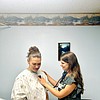Young professional spends summer aiding Libby Clinic
HAYDEN BLACKFORD | Hagadone News Network | UPDATED 2 years, 5 months AGO
There's a rural healthcare provider gap, but Libby Clinic has partnered with regional medical schools to help expose students to rural life.
A medical student, Ellen Dill, has spent August in Libby, working for the Rural and Underserved Opportunities Program in collaboration between the University of Washington and rural or small underserved communities.
The four-week immersion experience is an elective for students between their first and second years of medical school. Students work side-by-side with local physicians to provide health care and further the program's main objectives.
The program is intended to provide students with exposure to primary care and medical practices in rural or underserved urban settings. Students will hopefully come away with a positive attitude toward rural communities, and learn how local health care systems function.
Dill is originally from Spokane and earned her undergraduate degree in biochemistry at the University of Washington Seattle.
“After undergrad, I worked as a CNA in a Seale nursing home for five months during early COVID and then moved back to Spokane where I worked as a medical scribe for a medical oncologist at Cancer Care Northwest, before starting medical school,” Dill wrote in a bio of herself for the program.
Dill is interested in general surgery or becoming a doctor focused on women’s health. In her free time, she enjoys skiing, rock climbing or spending time with friends and family.
Dill received her undergraduate degree in 2020, but she started medical school in 2022 at the Spokane campus, which is a regional campus affiliated with the University of Washington Medical School, she said in a recent interview.
She draws some of her inspiration from her parents, who are both teachers. She also found some inspiration during her undergraduate degree after volunteering in a clinical setting.
“I just wanted to connect my love of science and learning with helping people directly,” she said.
Dill will be starting her second year of medical school and she will be participating in clinicals in the spring.
The goal is to expose medical students to rural practice, she said. There’s a real need for practitioners of any kind in rural areas. In the program, students don’t have a choice as to where they spend time, but they do get to choose the state – for Dill this was Montana.
“I'm really happy to be experiencing Montana, the people are so nice,” she said.
Dill added that she could see herself working in a town like Libby someday.
One thing that’s required by the program is a student project and Dill intends to complete a health education research project.
She’s done some research on Libby and is looking to create health education materials that people can use to increase their health literacy.
Health literacy is difficult to assess, she said. Patients might have the resources in front of them to make changes in their health, but they might not be able to understand what they’re seeing, she said.
“My health education material is looking at supporting an increase in health literacy potentially from an education standpoint, so starting at the high school level or even as a parent family education course,” Dill said.
Libby has a good high school graduation rate, and so she thinks this is a place people could be exposed to a health education that they can take with them, she said.
Currently, by working at the Libby Clinic with the providers there Dill is learning in a hands-on way and stepping into a new environment that she might now have otherwise been exposed to.
Dill said the program is a good opportunity to inspire young people who are interested in pursuing a degree in medicine or a STEM career and it helps to expose students to a rural setting.
“It's been a pretty difficult journey for me to get here but I think it's rewarding,” she said. "I think it's great that Libby is hosting students because it promotes education and best practices, she said.
A 2020 report from the Association of American Medical Colleges projected the United States will face a shortage of between 54,100 and 139,000 physicians by 2033.
Dill said such shortages can be detrimental in several ways and it means people with cancer may have to drive further or not get treatment, or in emergencies people may need to be transported to other hospitals more frequently.
Some providers rotate into rural areas, but communities need people who are invested in a community and who know the local challenges to make a significant impact, she said.
Unfortunately, a lot of doctors and nurse practitioners don't want to live rurally and that’s partially because they've never been in a rural setting before, Dill said.
“It just creates huge disparities in health care,” she said.
ARTICLES BY HAYDEN BLACKFORD

Flower Lake Road paving enhances access to recreation
Thanks to the perseverance of the Libby Outdoor Recreation Association, a section of Flower Lake Road is now paved.
The brouhaha over BORZ designations in Lincoln Co.
What are BORZ and what do these designations mean?

Young professional spends summer aiding Libby Clinic
The disparity between urban and rural healthcare is something that organizations are trying to bridge with exposure.

